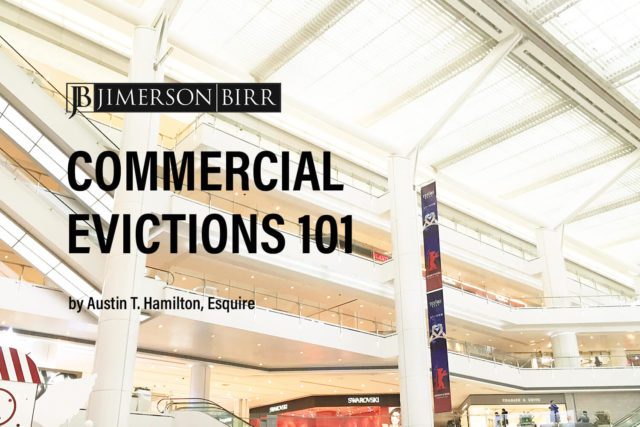What does ejectment encompass?
Ejectment is a legal remedy used in real estate dispute litigation to resolve conflicts over the rightful possession of a property. Individuals tend to seek this remedy when a person, who is not the lawful owner, occupies or possesses the property without the owner’s permission. Further, ejectment actions typically involve two parties: the plaintiff, who asserts superior title to the property, and the defendant, who possesses the property.
For example, an ejectment action may arise when a seller refuses to vacate a property after the sale has closed and the buyer has acquired the title. In this scenario, the buyer (plaintiff) can file an ejectment action against the seller (defendant) to regain possession of the property.
Need help with creating, structuring, or enforcing real estate agreements? Schedule your consultation today with a top real estate litigation attorney.
Which Florida laws, rules, and regulations apply to ejectment?
The primary statute governing ejectment in Florida is Florida Statutes §66.021. This statute outlines the requirements for bringing an ejectment action, including filing a complaint establishing the plaintiff’s legal title to the property and the defendant’s wrongful possession. Additionally, Florida Statutes §66.031 addresses the plaintiff’s right to recover damages for the defendant’s wrongful possession, such as rent or profits derived from the property during unlawful possession.
What are common issues associated with ejectment that lead to litigation?
The following issues tend to escalate real estate disputes to litigation:
- Title Disputes: Disagreements over the rightful ownership of a property can necessitate an ejectment action, where the plaintiff asserts superior title to the property in question.
- Wrongful Possession: When someone occupies a property without the owner’s permission, the owner may initiate an ejectment action to regain possession and, potentially, recover damages.
- Expired Lease: If a tenant remains on the property after the lease has expired, and the landlord wants to regain possession, an ejectment action may be necessary to remove the tenant.
- Boundary Disputes: When neighboring property owners disagree over the boundaries between their respective properties, an ejectment action can help resolve the dispute and restore rightful possession.
- Adverse Possession: If a person possesses another’s property openly and notoriously for a specific period, they may attempt to claim ownership through adverse possession, leading to an ejectment action.
When a set of facts is appropriate for legal advocacy or intervention, there are many paths a claimant may take. We are value-based attorneys at Jimerson Birr, which means we look at each action with our clients from the point of view of costs and benefits while reducing liability. Then, based on our client’s objectives, we chart a path to seek appropriate remedies.
To determine whether your unique situation may necessitate litigation or another form of specialized advocacy, please contact our office to set up your initial consultation.
What are effective measures to resolve issues and avoid litigation over ejectment?
To mitigate the risk of litigation over ejectment, consider implementing the following strategic measures:
- Clear Title: Ensure that property titles are clear and free of encumbrances before buying or selling, which can help prevent future disputes over ownership.
- Written Agreements: Enter well-drafted, legally enforceable written agreements (e.g., leases, rental agreements, and contracts) to establish each party’s rights and responsibilities, reducing the likelihood of misunderstandings.
- Boundary Surveys: Obtain a professional boundary survey to confirm property lines and reduce potential disputes with neighboring property owners.
- Consistent Communication: Maintain open and constant communication with tenants, lessees, or other parties involved in the property to address any concerns or issues before they escalate to litigation.
- Legal Counsel: Consult with experienced real estate attorneys to understand your rights and obligations under Florida law, helping you make informed decisions and avoid potential legal pitfalls.
- Alternative Dispute Resolution: Consider mediation or arbitration as alternative methods to resolve disputes over ejectment, potentially saving time, money, and the stress of litigation.
Please contact our office to set up your initial consultation to see what forms of legal advocacy or intervention may be available for your unique situation.
Frequently Asked Questions
- What is the difference between ejectment and eviction?
Ejectment generally involves the removal of a person who is wrongfully occupying a property or overstaying their lease. In contrast, eviction removes a tenant who has violated the terms of their lease or rental agreement. Ejectment actions are governed by Florida Statutes §§ 66.021 – 66.051, while evictions are governed by Florida Statutes §§ 83.20 – 83.682.
- How long does an ejectment action take in Florida?
The timeline for an ejectment action can vary depending on the complexity of the case and the court’s schedule. Generally, it may take several months to resolve the dispute. Therefore, consulting with an experienced real estate attorney who can provide a more accurate estimate based on your specific circumstances is essential.
- Can I recover damages in an ejectment action?
Yes, in an ejectment action, the plaintiff may be entitled to recover damages for the wrongful possession of the property. Damages may include rent or fair rental value, as well as any other loss suffered due to the wrongful possession, according to Florida Statutes §66.041.
- What is the burden of proof in an ejectment action?
In an ejectment action, the plaintiff must prove their superior title or right to possession of the property. This burden of proof typically involves providing evidence of a valid title, lease, or other legal documents establishing their rightful claim to the property.
- Can a property owner use self-help to remove a person in an ejectment situation?
In Florida, self-help measures, such as forcibly removing the occupant or changing the locks without a court order, are generally not allowed. Instead, property owners must follow the proper legal procedures, such as filing an ejectment action, to regain possession of their property.
Have more questions about real estate transactions and disputes?
Crucially, this overview of ejectment does not begin to cover all the laws implicated by this issue or the factors that may compel the application of such laws. Every case is unique, and the laws can produce different outcomes depending on the individual circumstances.
Jimerson Birr attorneys guide our clients to help make informed decisions while ensuring their rights are respected and protected. Our lawyers are highly trained and experienced in the nuances of the law, so they can accurately interpret statutes and case law and holistically prepare individuals or companies for their legal endeavors. Through this intense personal investment and advocacy, our lawyers will help resolve the issue’s complicated legal problems efficiently and effectively.
Having a Jimerson Birr attorney on your side means securing a team of seasoned, multi-dimensional, cross-functional legal professionals. Whether it is a transaction, an operational issue, a regulatory challenge, or a contested legal predicament that may require court intervention, we remain tireless advocates at every step. Being a value-added law firm means putting the client at the forefront of everything we do. We use our experience to help our clients navigate even the most complex problems and come out the other side triumphant.
If you want to understand your case, the merits of your claim or defense, potential monetary awards, or the amount of exposure you face, you should speak with a qualified Jimerson Birr lawyer. Our experienced team of attorneys is here to help. Call Jimerson Birr at (904) 389-0050 or use the contact form to schedule a consultation.


We live by our 7 Superior Service Commitments
- Conferring Client-Defined Value
- Efficient and Cost-Effective
- Accessibility
- Delivering an Experience While Delivering Results
- Meaningful and Enduring Partnership
- Exceptional Communication Based Upon Listening
- Accountability to Goals











